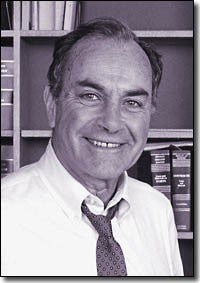Abram Chayes, Felix Frankfurter Professor of Law Emeritus, taught at Harvard for more than 40 years. He served as legal advisor to the State Department during the Kennedy Administration and exercised profound influence over many significant public policy issues at the height of the Cold War.

During the Cuban missile crisis of October 1962, Mr. Chayes led a team of State Department lawyers who developed the legal foundation for President Kennedy’s decision to have the Navy turn Soviet ships away from Cuba. The policy was called a quarantine and not a blockade. Under international law, a blockade could have been interpreted as an act of war.
The year before, Mr. Chayes was instrumental in persuading the administration to negotiate with the Russians over the status of Berlin at the same time as the United States was building up its nuclear and conventional forces. Others recommended that the administration forego negotiations and concentrate on preparing for a confrontation. Following the successful resolution of the Berlin crisis he helped negotiate the Limited Test Ban Treaty of 1963, which laid the foundation for three decades of arms control with the Soviet Union.
Mr. Chayes was also involved in shaping policy toward Africa and Asia. After President Kennedy’s death, Mr. Chayes stayed in the State Department for more than a year and worked on negotiations for Soviet participation in an international satellite system. In academic and legal circles he was recognized as one of the country’s leading authorities on international laws.
Professor Chayes was born in Chicago on July 18, 1922, to Edward and Kitty Chayes, both of whom were lawyers. He received his AB magna cum laude from Harvard in 1943, and then served with the field artillery in France, Holland, Germany and Japan. He was discharged with the rank of captain in 1946. On Christmas Eve, 1947, Mr. Chayes married Antonia (Toni) Handler.
He entered Harvard Law School in 1947 and graduated first in the class of 1949, receiving the Faye Diploma. He was also president of the Law Review. After law school, he became a legal advisor to Chester Bowles, then-governor of Connecticut. From 1951 to 1952 he served as law clerk for US Supreme Court Justice Felix Frankfurter. Mr. Chayes joined the faculty of the Harvard Law School in 1955 as an assistant professor.
Professor Chayes was one of the first group of Harvard faculty to depart for Washington after Kennedy won the presidency. After he returned to the Law School in 1965, Chayes continued to spend considerable time on international law issues, ranging from communications and international environmental matters to arms control. He became the Felix Frankfurter Professor of Law in 1976.
In 1977, Mr. Chayes followed his wife to Washington after President Carter appointed her the first woman Assistant Secretary and later Undersecretary of the US Air Force. During his time in Washington he taught at Georgetown University Law Center.
Mr. Chayes twice appeared before the International Court of Justice, most recently in 1999 as lead counsel for Namibia in the border dispute with Botswana over the status of Kasikii/Sedudu Island.
From 1984 to 1989 Mr. Chayes successfully represented the government of Nicaragua in a lawsuit in the World Court accusing the United States of violating international law by illegally mining Nicaraguan ports and attempting to overthrow the Sandinista government. There is “nothing wrong” he told an interviewer at the time, “with holding the United States to its own best standards and best principles.”
His publications include: The International Legal Process, 1969; The Cuban Missile Crisis: International Crisis and the Role of Law, 1974; and with Antonia Handler Chayes, The New Sovereignty: Compliance with International Regulatory Agreements, 1995; Preventing Conflict in the Post Communist World: Mobilizing International and Regional Organization, 1996; and Planning for Intervention: International Cooperation in Conflict Management, 1999. He taught, among other courses, Civil Procedure, International Legal Process, International Environmental Law and Institutions, International Peacekeeping and Introduction to American Law.
In April 1999 Mr. Chayes received the Harvard Law School Association Award, the highest honor given by the Association. The Law School celebrated his career with a two-day colloquium featuring panel discussions on important current issues in international law. Many of the panelists were former Ford Fellows in International Law, a program Mr. Chayes directed at the Law School to help create a new generation of international law teachers. In 1999 he joined the Boston office of the international law firm McDermott, Will and Emery and was counsel in the US-based suit charging Yugoslavian President Milosevic with genocide in Kosovo.
His family includes his wife of 52 years (at his death), Antonia Handler Chayes, visiting professor of international politics and law at the Fletcher School of Law and Diplomacy; and five children: Eve Chayes Lyman of Cambridge, Massachusetts, a photographer; Abigail Lyman of Los Angeles, California; Sara Chayes of Afghanistan and Paris, France, Special Advisor to the Commander of NATO’s International Security Assistance Force; Lincoln Chayes of Los Angeles, California, professor of mathematics at UCLA; and Angelica Chayes of Canaan, New York, Internet Marketing Manager for Jane Iredale Cosmetics; a sister, Judith Chayes Neiman (now deceased) of Baltimore, Maryland; nine grandchildren and one great-grandchild.